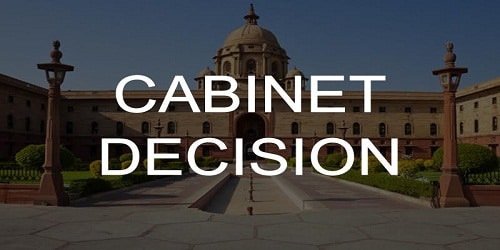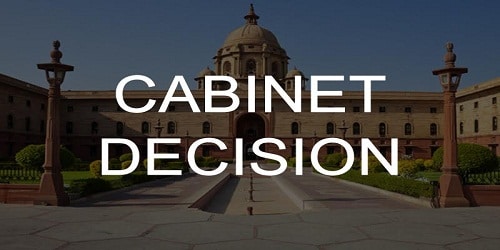The Union Cabinet chaired by Prime Minister Shri Narendra Modi approved the following proposals on July 31, 2019: Approval to the extension of term of the commission constituted under Article 340 of the constitution to examine the issue of Sub-categorization within Other Backward Classes in the Central List
Approval to the extension of term of the commission constituted under Article 340 of the constitution to examine the issue of Sub-categorization within Other Backward Classes in the Central List
Approval was given to the extension of the term of the commission constituted under Article 340 of the constitution to examine the issue of Sub-categorization within Other Backward Classes (OBCs) in the Central List by 6 months beyond 31st July, 2019 and upto 31st January, 2020.
- Benefits: It will help the commission to submit a comprehensive report on the issue of sub-categorization of OBCs, after consultation with various stakeholders.
Approval to the Nutrient Based Subsidy (NBS) rates for Phosphatic and Potassic (P&K) fertilizers for the year 2019-20
Approval was given to the proposal of the Department of Fertilizers for fixation of Nutrient Based Subsidy Rates for P&K Fertilizers for the year 2019-20. The approved rates for NBS effective from July 31, 2019 are as follows:
| Per Kg Subsidy rates (Rs.) | |
| N (Nitrogen) | 18.901 |
| P(Phosphorus) | 15.216 |
| K(Potash) | 11.124 |
| S(Sulphur) | 3.562 |
- The per kg. subsidy rates prior to notification dated July 31, 2019 will remain same as that of year 2018-19.
- Expenditure: The expected expenditure for release of subsidy on P&K Fertilizers during 2019-20 will be Rs. 22875.50 crore.
- Background: Government aims to make fertilizers, Urea and 21 grades of P&K fertilizers available to farmers at subsidized prices through fertilizer manufacturers/importers. The subsidy on P&K fertilizers is being governed by NBS Scheme with effect from April 1, 2010. In accordance to its farmer friendly approach, the Government is committed to ensure the availability of P&K fertilizers to farmers on affordable price.
Approval to the J&K Reservation (Second Amendment) Bill 2019
Approval was given to the Jammu & Kashmir Reservation (Second Amendment) Bill, 2019 which provides for the extension of the benefit of reservation of up to 10% for Economically Weaker Sections (EWS) in educational institutions and public employment alongside existing reservations.
- Background: In January 2019, Centre had approved a constitutional amendment to provide a 10% reservation to the Economically Weaker Sections for direct recruitment in government jobs and higher education institutes.
- Status: This quota is over and above the reservation cap of 50% to Scheduled Castes, Scheduled Tribes and Other Backward Classes. The Centre has defined those with an annual income of less than Rs 8 lakh as economically weaker.
Approval to increase the strength of SC judges from 31 to 34
Approval was given to increase the number of judges in the Supreme Court (SC) from 30, at present, to 33, excluding the Chief Justice of India (CJI).
- Present Status: The Supreme Court is working with its full sanctioned strength of 31, including the CJI.
- Act: The Supreme Court (Number of Judges) Act, 1956 was last amended in 2009 to increase the judges’ strength from 25 to 30 (excluding the CJI). It originally provided for a maximum of 10 judges (excluding the CJI). This number was increased to 13 by the Supreme Court (Number of Judges) Amendment Act, 1960, to 17 in 1977, to 25 in 1986 and to 30 in 2009.
- Background: The decision of the cabinet came days after CJI Ranjan Gogoi wrote to Prime Minister Narendra Modi to increase the number of judges in SC. 59,331 cases are pending and due to scarcity of judges, the required number of constitution benches to decide important cases involving questions of law were not being formed.
About Union Cabinet:
The Union Council of Ministers exercises executive authority in India. It consists of senior ministers called cabinet ministers, junior ministers called ministers of state and, rarely, deputy ministers. It is led by the Prime Minister.





